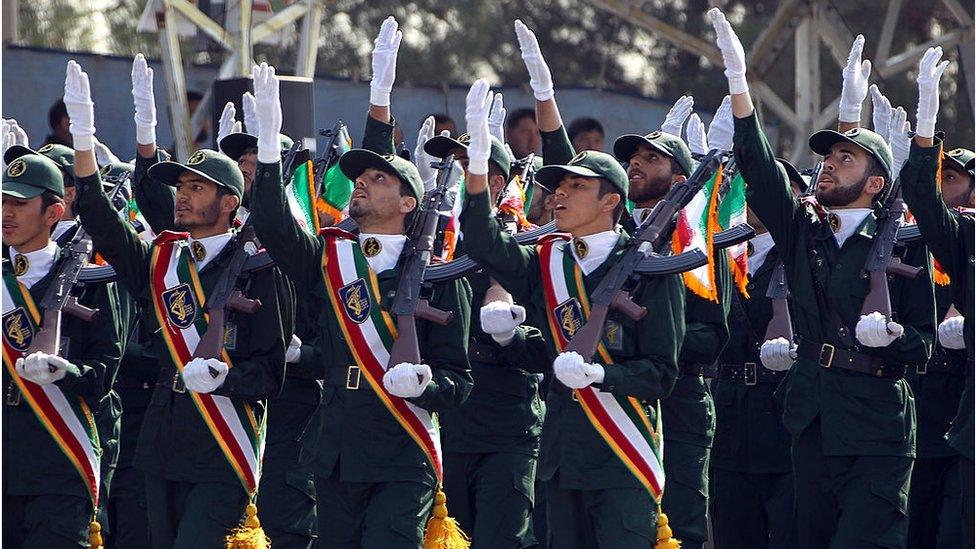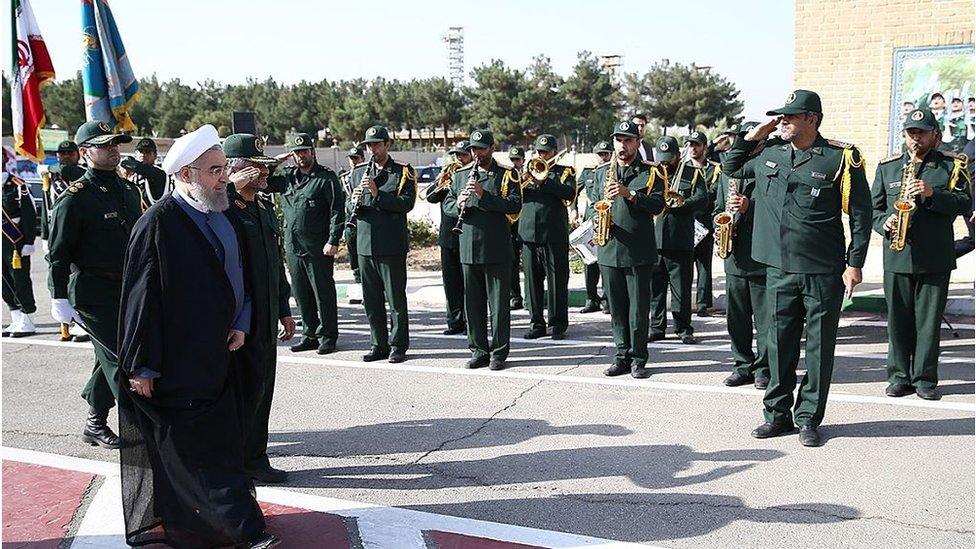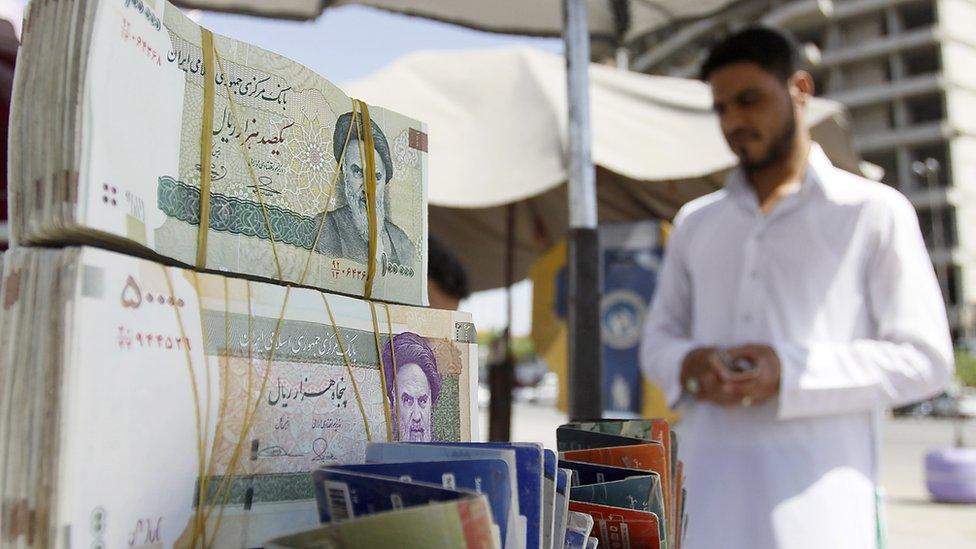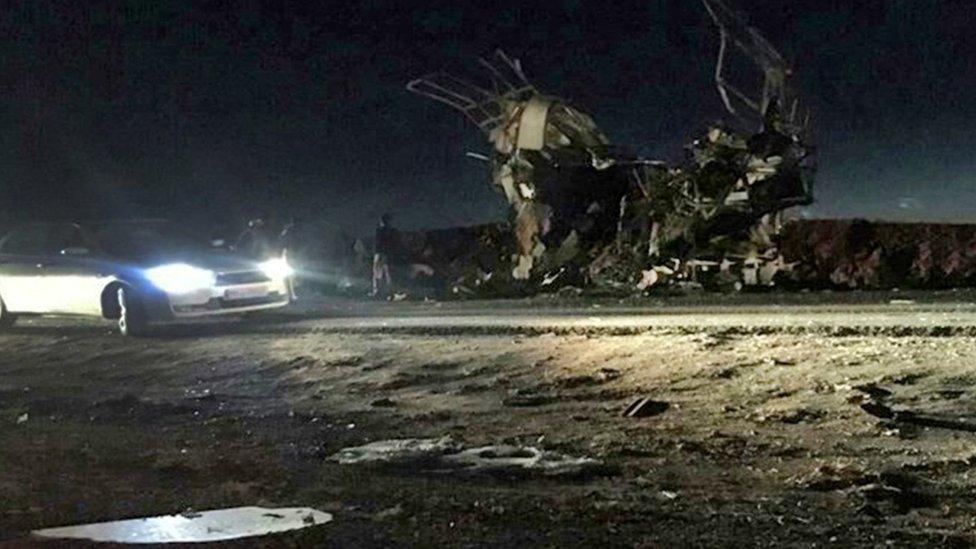Revolutionary Guard Corps: US labels Iran force as terrorists
- Published

The US has sanctioned parts of the IRGC before
US President Donald Trump has designated Iran's elite Revolutionary Guard Corps (IRGC) as a foreign terrorist organisation.
It is the first time the US has labelled another nation's military as a terrorist organisation.
Iran retaliated by declaring US forces in the Middle East as a terrorist organisation, Iran state news reported.
Washington-Tehran tensions have risen since Mr Trump withdrew the US from the international Iran nuclear pact.
Labelling the Guards as a terrorist organisation will allow the US to impose further sanctions - particularly affecting the business sector, given the IRGC's involvement in Iran's economy.
A number of IRGC and affiliated entities have already been targeted by US sanctions for alleged proliferation activities, support for terrorism and human rights abuses.
What did President Trump say?
Mr Trump's statement on Monday said: "This unprecedented step, led by the Department of State, recognises the reality that Iran is not only a State Sponsor of Terrorism, but that the IRGC actively participates in, finances, and promotes terrorism as a tool of statecraft."
Pompeo announces the "historic step" against Iran's Revolutionary Guards Corp
The president added that the move was meant to "significantly expand the scope and scale" of pressure on Iran.
"If you are doing business with the IRGC, you will be bankrolling terrorism," Mr Trump said.
The measure will take effect in one week's time, according to the State Department.
Was there any dissent in the Trump administration?
US Secretary of State Mike Pompeo and National Security Adviser John Bolton, both Iran hawks, championed the decision, but not all US officials were so supportive.
Mr Pompeo told reporters on Monday the US will continue to sanction and pressure Iran to "behave like a normal nation" and urged America's allies to take similar action.
"The leaders of Iran are not revolutionaries and people deserve better," Mr Pompeo said. "They are opportunists."
In a later tweet, he added: "We must help the people of Iran get back their freedom."
Allow X content?
This article contains content provided by X. We ask for your permission before anything is loaded, as they may be using cookies and other technologies. You may want to read X’s cookie policy, external and privacy policy, external before accepting. To view this content choose ‘accept and continue’.

Mr Bolton said labelling the IRGC as terrorists was "the rightful designation".
Allow X content?
This article contains content provided by X. We ask for your permission before anything is loaded, as they may be using cookies and other technologies. You may want to read X’s cookie policy, external and privacy policy, external before accepting. To view this content choose ‘accept and continue’.

But some Pentagon officials, including Joint Chiefs of Staff Chairman Gen Joe Dunford, had expressed concerns about troop safety, the Wall Street Journal reported, external.
Military officials cautioned the designation could incite violence against US forces in the Middle East without severely impacting Iran's economy.
The Central Intelligence Agency had also reportedly opposed the move.
What was the response?
Iran's national security council declared US Central Command (Centcom) a terrorist organisation after Foreign Minister Javad Zarif wrote to President Hassan Rouhani urging such a response, state news channel IRINN said.
Centcom is the Pentagon wing that oversees Washington's security interests across the central area of the world map, most notably Afghanistan, Iraq, Iran, Pakistan and Syria.
The Islamic Republic had warned it would retaliate in kind last week, after reports of the Trump administration plan first surfaced.
"We will answer any action taken against this force with a reciprocal action," a statement issued by 255 out of the 290 Iranian MPs said, according to the state-run IRNA news agency.
But Israeli Prime Minister Benjamin Netanyahu, who is battling for political survival in Tuesday's elections, cheered the US move.
Allow X content?
This article contains content provided by X. We ask for your permission before anything is loaded, as they may be using cookies and other technologies. You may want to read X’s cookie policy, external and privacy policy, external before accepting. To view this content choose ‘accept and continue’.

This could backfire

This move underscores the Trump administration's desire to isolate and stigmatise Iran, though it is unlikely to have a significant impact upon the Revolutionary Guard Corps' activities.
Few Western commentators would disagree that the IRGC is responsible for all sorts of disruptive activities in the region and beyond.
But many - including it seems some officials in the US Department of State and the Pentagon - fear that this step could simply backfire.
The fear is that it could encourage the IRGC or its proxies to take action against US personnel or other targets in places where they might be vulnerable, for example in Iraq.
What this move does do is signal the unremitting desire of the Trump Administration to ramp up its battle with Tehran which some fear may, one day, spill into open military conflict.


Iran's President Hassan Rouhani (left) seen at the 21st Nationwide Assembly of the IRGC in 2015
What is the IRGC?
Iran's most elite military unit, the IRGC was set up shortly after the 1979 Iranian revolution to defend the country's Islamic system, and to provide a counterweight to the regular armed forces.
It has since become a major military, political and economic force in Iran, with close ties to the Supreme Leader, Ayatollah Ali Khamenei, and many other senior figures hailing from its ranks.
The IRGC is estimated to have more than 150,000 active personnel, boasts its own ground forces, navy and air force, and oversees Iran's strategic weapons, including its ballistic missiles.
The IRGC exerts influence elsewhere in the Middle East by providing money, weapons, technology, training and advice to allied governments and armed groups through its shadowy overseas operations arm, the Quds (Jerusalem) Force.
- Published3 November 2018
- Published12 February 2019
- Published26 September 2018

- Published14 February 2019
